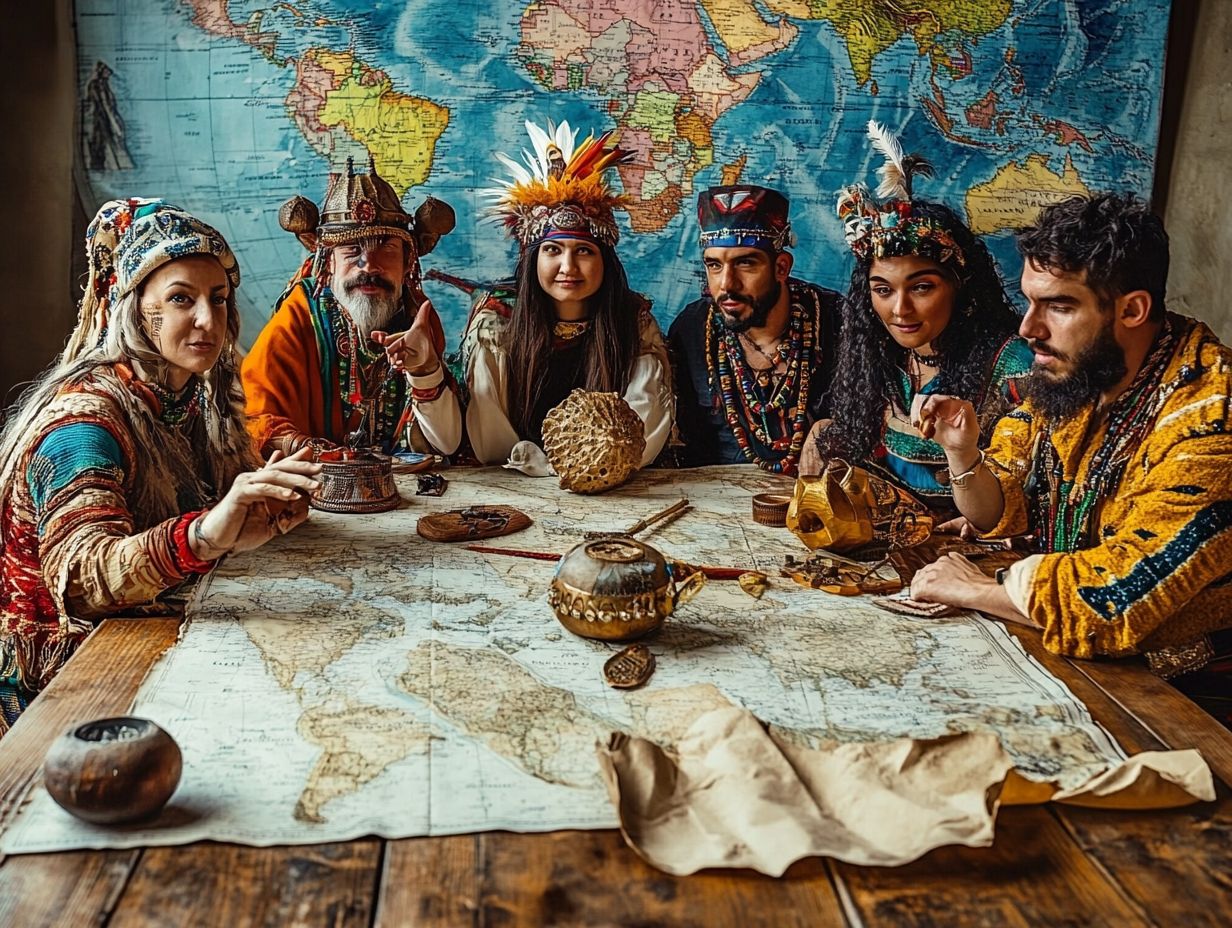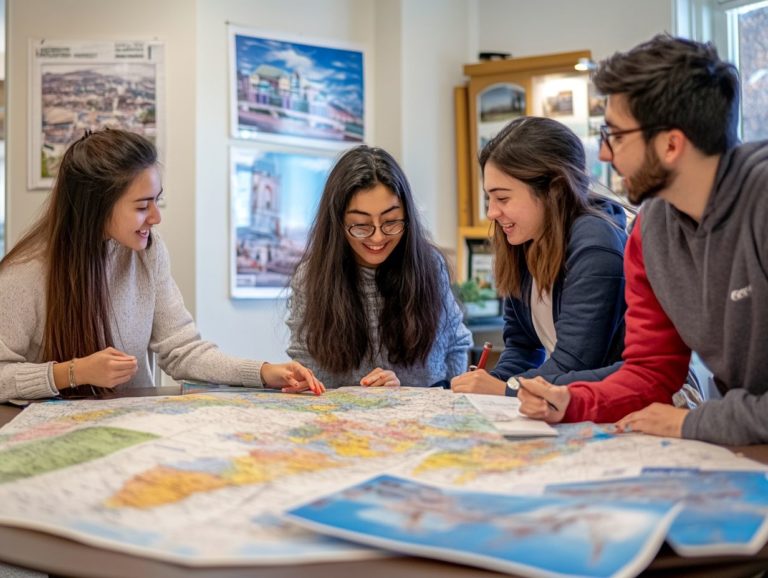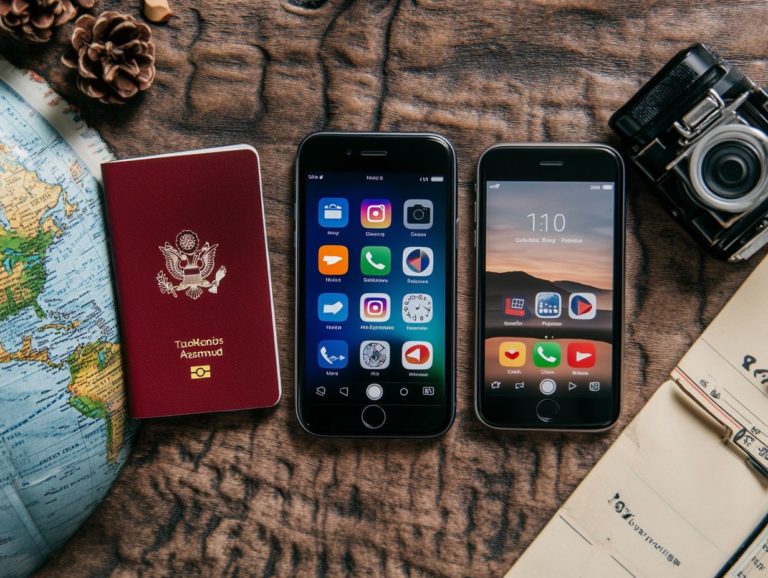5 Tips for Navigating Cultural Differences
Navigating cultural differences presents a thrilling yet challenging journey, especially when you find yourself traveling to new destinations or engaging with diverse communities.
Grasping and respecting the myriad customs, languages, and traditions is essential for cultivating meaningful connections. This article presents five essential tips to guide you in approaching different cultures with an open mind and genuine curiosity.
By learning basic phrases and observing local customs, these strategies will not only enhance your experiences but also deepen your appreciation for the rich tapestry of cultures that the world has to offer.
Contents
- Key Takeaways:
- 1. Be Respectful and Open-Minded
- 2. Do Your Research Beforehand
- 3. Learn Basic Phrases in the Local Language
- 4. Observe and Adapt to Local Customs
- 5. Dive Deeper: Ask Questions and Seek Clarification
- What Are Some Common Challenges When Navigating Cultural Differences?
- Frequently Asked Questions
- What are the 5 tips for navigating cultural differences?
- Why is it important to educate yourself about a different culture?
- How can being open-minded and respectful help when navigating cultural differences?
- What role does effective communication play in navigating cultural differences?
- Why is it important to be aware of non-verbal cues when interacting with someone from a different culture?
- How can patience and understanding benefit when navigating cultural differences?
Key Takeaways:
- Respect and open-mindedness are key in understanding cultural differences.
- Research the culture before you travel to avoid misunderstandings.
- Learning basic phrases can show respect and help you connect.

1. Be Respectful and Open-Minded
Being respectful and open-minded is essential when navigating cultural differences. These traits foster communication between different cultures and enable you to appreciate diverse perspectives. For more insights, check out understanding cultural differences when traveling, ultimately leading to mutual respect and understanding in your social interactions.
Effective communication serves as a bridge, connecting you with individuals from various backgrounds while encouraging the sharing of unique experiences and values. By cultivating empathy, you enhance your ability to recognize and honor cultural nuances, which is vital for building relationships in diverse environments.
This awareness paves the way for more meaningful conversations, reducing the misunderstandings and assumptions that often stem from cultural stereotypes. When you prioritize empathy, you lay a foundation of trust and openness, facilitating collaborative interactions that transcend barriers.
Ultimately, this awareness promotes a more inclusive society where everyone feels valued and understood.
2. Do Your Research Beforehand
Researching cultural customs and values beforehand is crucial for grasping the intricate practices and how people s identities affect their interactions that can significantly influence your interactions in a foreign environment.
Utilizing a variety of research methods can greatly enhance your understanding. Engaging in online forums allows you to hear firsthand experiences from locals or expatriates, providing nuanced perspectives on social behaviors. Reading both academic and popular literature can unveil historical contexts and current cultural dynamics.
It s also essential to comprehend concepts like the way people view authority and hierarchy, as these can shape interactions based on social structures. By developing cultural intelligence, you can navigate these complex landscapes more effectively, minimizing potential misunderstandings and fostering richer, more respectful exchanges with individuals from diverse backgrounds.
3. Learn Basic Phrases in the Local Language
Learning basic phrases in the local language significantly enhances your ability to connect with locals and showcases your respect for their culture. It also paves the way for smoother communication, helping you navigate various styles and non-verbal cues with ease.
This foundational knowledge can transform casual encounters into truly meaningful exchanges, fostering a sense of trust and camaraderie. For example, a simple greeting like “Bonjour” in French or “Hola” in Spanish can unlock friendly conversations, while phrases such as “Can you help me?” or “Thank you” convey appreciation and humility.
By immersing yourself in the culture whether through participating in traditional festivities or engaging in daily activities you create opportunities for shared experiences that deepen relationships. This dynamic interaction not only enriches your understanding of the language but also cultivates lasting bonds, highlighting the profound impact language has on social connections.
4. Observe and Adapt to Local Customs

Observing and adapting to local customs is essential for effective intercultural communication. This practice demonstrates your understanding of different cultures, fostering positive relationships and helping mitigate potential cultural conflicts.
To start, consider quietly observing social interactions within the community. Pay close attention to body language, greetings, and shared rituals. Be sure to observe carefully; it s the key to understanding. Approach these observations with subtlety, allowing others to feel comfortable in their environment.
Adaptability is key. By gently integrating these customs into your interactions, you can facilitate smoother dialogues. For additional insights, learn how to navigate cultural differences in your internship. This gradual immersion enriches your personal experiences and leads to deeper cultural exchange, ultimately fostering greater understanding and appreciation of diverse backgrounds.
5. Dive Deeper: Ask Questions and Seek Clarification
Engaging in open communication by asking questions and seeking clarification is essential for developing cultural awareness. This approach fosters meaningful discussions and deepens your understanding of diverse perspectives.
It transcends mere dialogue; it embodies the essence of really listening truly absorbing what others convey, both verbally and non-verbally. By actively engaging in this manner, you can discern nuances in communication that might otherwise be overlooked, enriching the exchange of ideas. When you seek clarification, it reflects your commitment to understanding, paving the way for empathy to blossom.
This approach leads to fruitful collaborations and cultivates a respectful appreciation for varying cultural practices. Ultimately, it enhances your interpersonal relationships and fosters greater harmony in diverse environments.
Navigating cultural differences can present common challenges, including cultural conflicts, uncertainty avoidance, and the persistence of cultural stereotypes. Understanding how to approach cultural differences with respect can help alleviate these obstacles, significantly improving effective relationship building and emotional regulation during cross-cultural interactions.
For example, misunderstandings often arise when you and someone from a different culture interpret gestures or tones in vastly different ways. This can lead to potential miscommunication and frustration. Emotional regulation is crucial in this context; managing your responses can foster more productive dialogues.
Employing strategies like really listening, empathy, and open-mindedness is essential for overcoming these barriers. Engaging in cultural immersion and education will enhance your awareness and appreciation of diverse cultural backgrounds, helping to reduce stereotypes and promote harmonious exchanges.
Building these skills not only smooths your interactions but also deepens mutual respect and understanding.
How Can One Prepare for a Trip to a Different Culture?
Preparing for a trip to a different culture means diving deep into the cultural nuances that shape everyday interactions. By enhancing your cultural awareness and conducting thorough research on local customs, you set the stage for respectful encounters and meaningful exchanges.
This thoughtful preparation significantly reduces the chances of misunderstandings and fosters an environment of mutual respect. Engaging with local communities online whether through forums or social media offers invaluable insights into everyday life and unique traditions that you might not find in guidebooks.
Familiarizing yourself with key cultural values, such as personal space, communication styles, and social hierarchies, will make your interactions smoother. By immersing yourself in these foundational elements, you can refer to tips for adjusting to life in a new culture to navigate social situations with greater ease, ultimately leading to authentic connections and enriching experiences throughout your journey.
What Are Some Tips for Communicating Effectively Across Cultures?

Effective communication across cultures demands that you grasp various communication styles, including both direct and indirect approaches. It also requires a sharp awareness of non-verbal cues and the art of active listening.
To thrive in diverse cultural settings, it s essential for you to adapt your language and tone to resonate with your audience. For example, opting for simpler language can significantly bridge the gap when conversing with individuals who may not be fluent in the language.
Recognizing and interpreting non-verbal signals like gestures, facial expressions, and body language are crucial in uncovering the intentions behind spoken words. By cultivating empathy and considering the preferences of others, you create a more inclusive environment that fosters open dialogue and reduces the chances of miscommunication.
These thoughtful adaptations enhance clarity and strengthen connections among individuals from diverse backgrounds.
How Can One Avoid Cultural Misunderstandings?
Avoiding cultural misunderstandings rests on your ability to cultivate cultural awareness, practice active listening, and engage in open communication. These practices clarify intentions and foster empathy, which is essential in a world where diverse perspectives can easily lead to confusion and conflict. To further enhance your understanding, it’s helpful to learn how to prepare for cultural differences.
You might encounter common triggers for misunderstandings, such as varying communication styles, assumptions rooted in stereotypes, or even body language that differs from one culture to another. To navigate these challenges effectively, consider top tips for adapting to a new culture and approach conversations with an open mind and a genuine willingness to learn from others.
Empathy is crucial, encouraging you to consider the viewpoints and feelings of those from different backgrounds. By fostering an environment of respect and understanding, you can break down barriers and build meaningful connections.
What Are Some Ways to Show Respect for a Different Culture?
Respecting a different culture begins with understanding and honoring its unique practices, hospitality customs, and the core values that shape its identity.
For example, imagine the impact of greeting someone in their native language or donning traditional attire during local festivals. These gestures can create a profound connection and appreciation for the culture. Sharing meals, where food often takes center stage, allows you to savor the flavors and stories embedded in each dish, offering a taste of the community s heritage.
Recognizing the significance of rituals, such as the role of family gatherings in various societies, reveals an understanding of what truly matters to that community. When you acknowledge and participate in these customs, you enhance your own experiences and foster genuine cultural exchange, strengthening global ties through respect and understanding.
How Can One Embrace and Appreciate Cultural Differences?
Embracing and appreciating cultural differences begins with developing your understanding of different cultures, which in turn fosters relationship-building and cultivates empathy through meaningful cultural exchanges.
This journey is exciting! It enriches your life and weaves a vibrant tapestry of understanding within your community. Engaging in open dialogues, participating in cultural events, and embracing diverse viewpoints can significantly elevate mutual respect and collaboration in your interactions.
As you immerse yourself in distinct traditions and practices, you’ll often uncover shared values that transcend cultural boundaries. These intercultural experiences lead to transformative personal growth, encouraging a mindset that values inclusion as the foundation for a harmonious society.
Ultimately, nurturing an inclusive culture is essential for building relationships that celebrate diversity and promote lasting understanding among everyone involved.
Frequently Asked Questions

- Educate yourself about the culture
- Be open-minded and respectful
- Communicate clearly and effectively
- Be aware of non-verbal cues
- Be patient and understanding
Why is it important to educate yourself about a different culture?
Educating yourself about a different culture helps you understand their customs, beliefs, and values. This knowledge can help build respect and understanding.
Being open-minded and respectful helps you appreciate cultural differences. This attitude fosters a more inclusive environment.
Effective communication is essential! It helps avoid misunderstandings and promotes clear understanding between individuals from different cultures.
Why is it important to be aware of non-verbal cues when interacting with someone from a different culture?
Non-verbal cues, which include body language and gestures, can vary greatly between cultures. Understanding these cues can help you adapt to cultural differences.
Patience and understanding are key to navigating cultural differences. Start your journey to understanding with these 5 tips for understanding non-verbal cues abroad and build stronger relationships!





